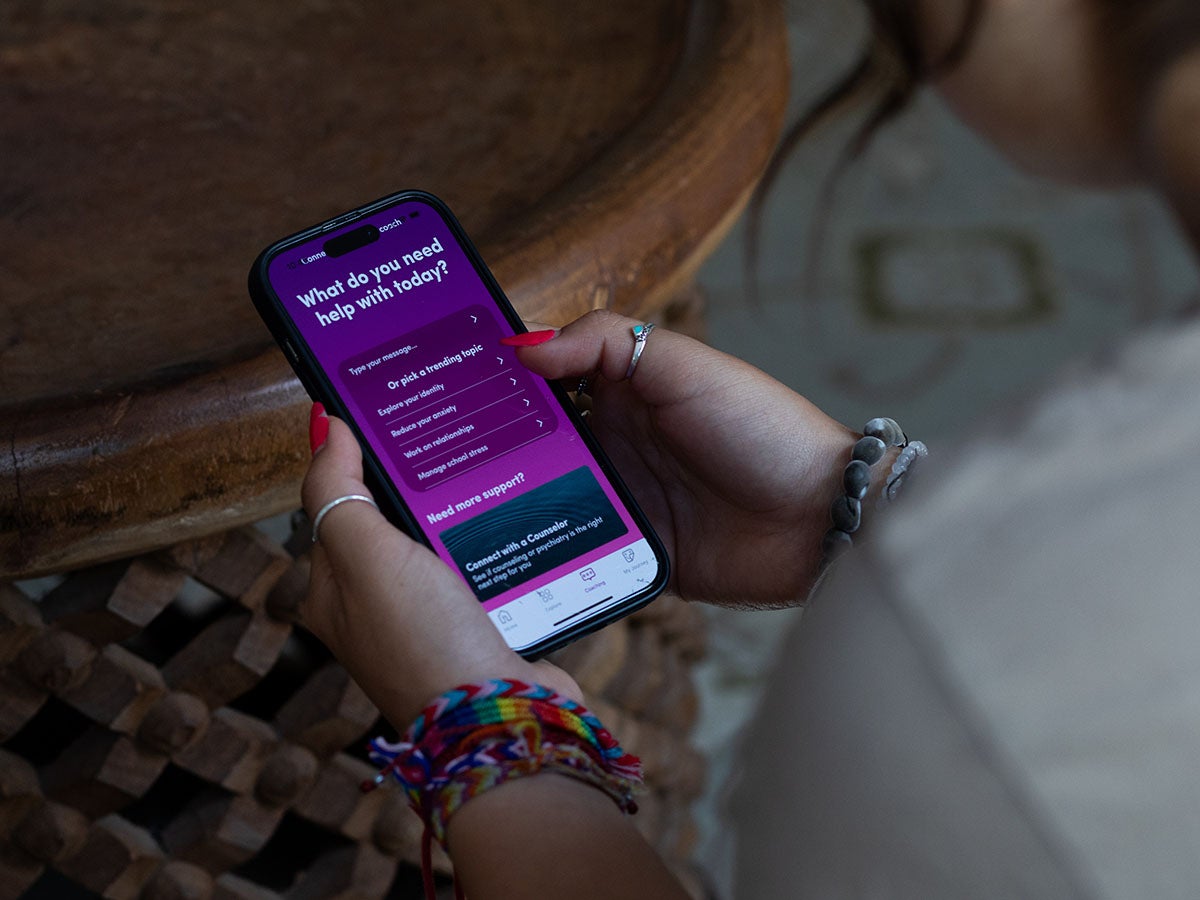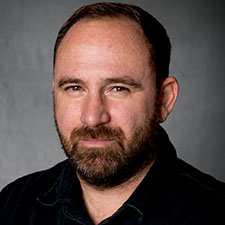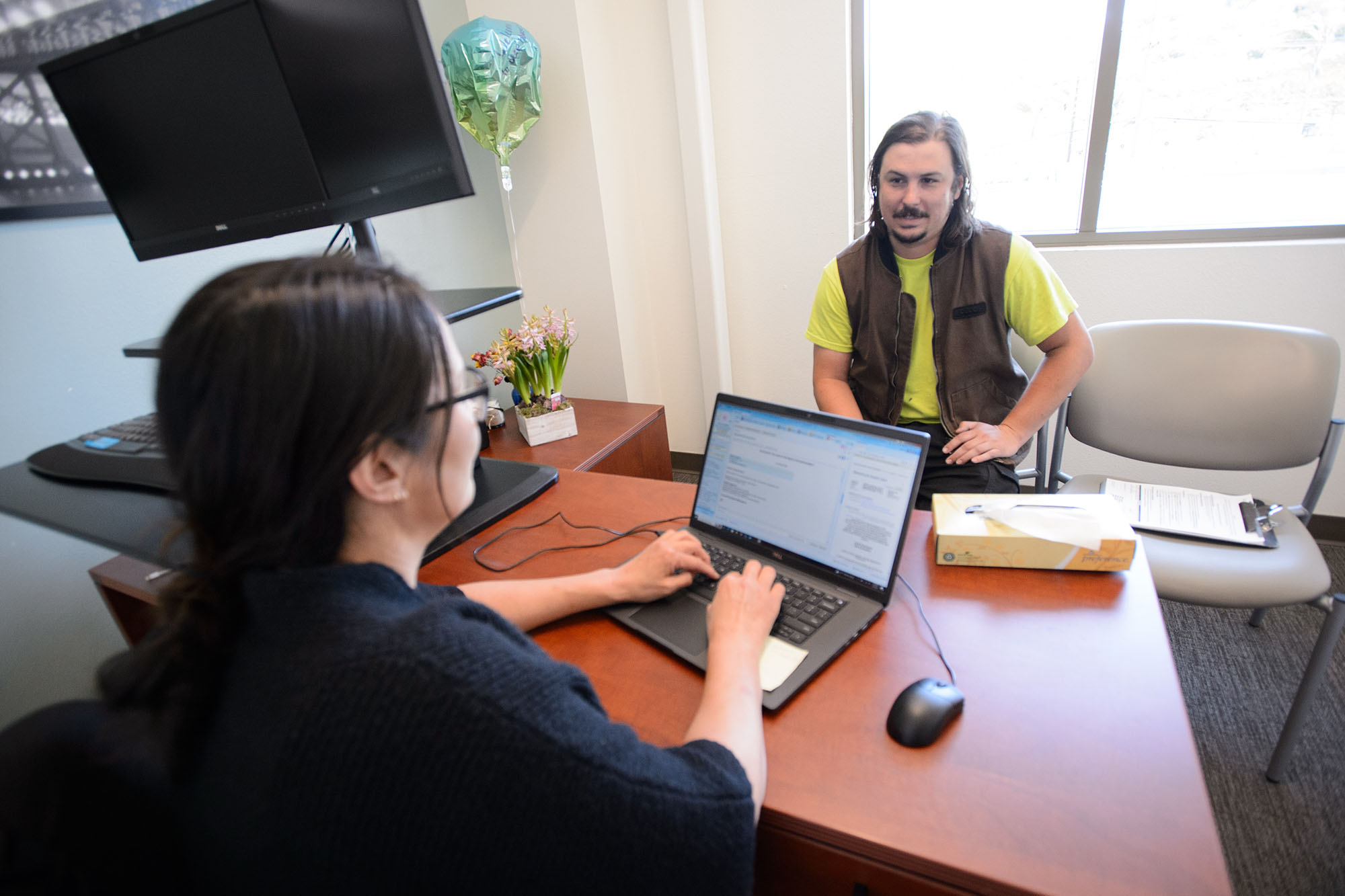|
Getting your Trinity Audio player ready…
|

When she started middle school in 2020, Ava Capen felt depressed, anxious, and a little lost. The previous year the COVID-19 pandemic had shut down California schools, and she spent the final months of fifth grade and most of sixth grade attending classes online.
No more hanging out with friends every day. No more playing basketball. Instead, being at school meant sitting at a desk in her bedroom, staring at a computer all day. Many mornings, Ava didn’t even want to get out of bed.
“I was super unmotivated,” said Ava, now 14. “I was kind of stuck in this funk.”
Even as her school attempted to return to normal, Ava couldn’t shake her melancholy. Then, at 13, in eighth grade, a close friend recommended Capen try the app BeMe, a mental health platform for teens.
Founded in 2021, the Miami-based BeMe is designed for the digital-first generation with a user display and function similar to social media platforms commonly used by adolescents. People between 13 and 19 years old can scroll through educational content about mental health presented in the form of videos, photos, and text to maximize engagement for young people. To tap into the youth mindset, BeMe consults with an advisory board that is currently comprised of 133 teenagers, including Ava.
BeMe also offers tiered levels of clinical help, depending on the need, from support coaches and therapists, to 24-hour access to crisis management. BeMe says it has raised $17 million and currently serves 150,000 teenage users.
Upcoming Study
In a study in the Journal of Medical Internet Research mHealth and uHealth, Stanford University researchers found that BeMe is engaging and supportive. In surveys, 13,000 adolescent BeMe users rated the app’s digital content as improving their sense of hope (83%), self-esteem (84%), and confidence to use coping skills (92%). The participants rated BeMe’s text-based coaching as helpful (84%) and useful for coping with stress (84%).
On the app, Ava found videos of breathing techniques and inspirational quotes, as well as a digital notebook for sketching and journaling. With the help of BeMe, Ava started the practice of breathing meditations to reduce her anxiety, especially before and after tests. It’s one of her favorite features on the app. What really spoke to Ava, though, were the inspirational quotes, such as “Trust the next chapter because you’re the author.”
“It’s cheesy, but I love that one,” she said. “It just gives me a lot of hope that I can stay on the right path and do what I want and be happy.”

A Teenage Mental Health Crisis
The COVID-19 pandemic not only laid bare the mental health crisis teenagers were experiencing, it made it worse. Worldwide, one meta-analysis study found rates of childhood and adolescent depression and anxiety doubled during the first year of the pandemic. In the US, more than 4 in 10 children and teenagers have been grappling with persistent feelings of sadness and hopelessness, just like Ava; 1 in 5 students said they seriously considered attempting suicide, and 1 in 10 did attempt suicide.
LGBTQ+ youth face significantly higher suicide risk than their peers. The Trevor Project estimates 1.8 million LGBTQ+ youth (13-24) seriously consider suicide annually in the US, with one attempt occurring every 45 seconds. According to the organization’s 2022 survey, 45% of LGBTQ+ youth considered suicide, including over half of transgender and nonbinary youth.
In California, nearly half of kids between 12 and 17 reported struggling with mental health issues, with one-third of them experiencing serious psychological distress. Young people from families with low incomes, and those who are multiracial, gender nonconforming, or foreign-born are more likely to be affected. Yet, the state has fewer than 1,135 child and adolescent psychiatrists to serve almost 10 million people younger than 18, with the worst shortages in rural areas.
The California Health Care Foundation (CHCF), recognizing the need for innovative ways to tackle the teen mental health crisis, invested $1.45 million in BeMe’s digital-first approach to increasing behavioral health services for young Californians, especially Latino/x youth and those in families with low incomes.
CHCF supports BeMe to further the foundation’s goals of expanding the use of telehealth in safety-net health care institutions, improving access to timely mental health care, facilitating care coordination among local providers, and integrating mental health services into schools.
Partnerships with School Districts, Medi-Cal Plans
Among digital behavioral health solutions, BeMe stands out by offering nonclinical and clinical services focused exclusively on young people, said Melissa Buckley, director of the CHCF Innovation Fund.
BeMe prioritizes partnerships with school districts and Medi-Cal health plans to broaden access to mental health support, Buckley said. That is a rarity. Most digital health companies sell primarily through employers or directly to customers. BeMe charges a per-member, per-month fee for nonclinical services, technology, and text-based coaching, and a fee-for-service payment for clinical care, such as psychotherapy.
“Access to behavioral health services for youth is a significant pain point for Medi-Cal health plans,” Buckley said. “BeMe has the potential to increase access to care for youth by putting mental health educational tools in their hands via their phones and enhancing the capacity of California’s therapist workforce.”
In California and nationwide, the dire shortage of behavioral health workers means it can take months to get an appointment with a therapist. BeMe eases access by connecting young people with live support coaches who are available 14 hours a day, seven days a week. If a higher level of care is required, BeMe has partnerships with licensed therapists and psychiatrists.
Young people can also text or call crisis management 24 hours a day if they need to.
Built for Youth
While BeMe’s business model centers around partnerships with payers, its distribution channels run through schools, pediatricians, and therapists’ offices, allowing for accessibility and reach within the target audience.
Its growing customer base includes national and California-based health plans such as Molina Healthcare, CareSource, Cigna, Kaiser Permanente, and UnitedHealthcare, encompassing both Medicaid and commercial lines of business.
CHCF’s partnership with BeMe will also advance work to help Latino/x youth and families. This includes recruitment of a dedicated Latino/x leadership team, increased outreach within Latino/x communities, collaboration with influential Latino/x social media content creators, and enhancement of the Spanish-language version of the app.
Latino/x youth have high rates of mental health illness but are less likely to receive mental health services than their peers, according to studies. Several factors combine to affect the mental health of Latino/x youth such as COVID-19, immigration issues, and lack of access to health care.
In addition to offering Spanish-speaking content, according to the start-up, 50% of the company’s employees people of color, and the teen advisory board is highly diverse.
To ensure the technology-enabled solutions are addressing the mental health needs of Latino/x youth, BeMe will measure its impact in partnership with CHCF and Stanford University researchers. The company will assess the reduction in symptoms of anxiety, stress, depression, and trauma, and it will evaluate the effectiveness of non-clinical services such as coaching and self-education.
Helping Teens Flourish
The adolescent segment of the population is difficult to reach and doesn’t connect easily to traditional providers, many of whom don’t relate well to a digital-first generation, said clinical psychologist Nicoletta Tessler, PsyD, CEO and co-founder of BeMe.
Tessler co-founded BeMe to enable teens to access a continuum of services tailored to individual needs ranging from preventive educational material to text or phone conversations with a live coach or therapist.
BeMe content is both engaging and evidence-based, she said. Users may or may not notice that the content has psychological models baked into it: dialectical behavior therapy, cognitive behavioral therapy, positive psychology, and motivational interviewing. To make the platform, including the videos, text, and other features, more enticing, BeMe employs a team of experts, some of whom previously worked at Disney and Facebook, and all of whom understand engagement and metrics, she noted.
“We don’t want teens to just endure, we want them to flourish,” Tessler said. “Teens are using BeMe to craft a life that is worth living.”
The Next Generation of Mental Health
Ava, who will be attending high school in the fall, found BeMe so helpful that she joined the company’s teen advisory board, which meets regularly during the school year to discuss ways to continually improve BeMe’s user interface and website.
Recently, the advisory board persuaded BeMe to remove photos with a “dated” look that made the people look too colorful and cast a bright yellow shadow, Ava said.
“Nowadays, teenagers like more subtle colors that aren’t super bright and kind of scary,” she said. “It was kind of alarming and didn’t match the rest of BeMe.”
Ava takes part in the BeMe creator program, which helps her make mental health-related content for the app, posting up to five pieces a week. She recently made a video about calming techniques she uses when she feels anxious, such as cleaning her space, taking a walk, or eating something healthy. Ava’s recommendation: almond butter toast with banana and strawberry.
“I’m in such a better mental space than I was a year ago,” she said. “I feel so much lighter. I feel so much happier.”
Authors & Contributors

Brian Rinker
Brian Rinker is a freelance writer and journalist. He covers digital health, public health, child welfare, start-ups, and venture capital. His work has been published by Kaiser Health News, Health Affairs, The Atlantic, Men’s Health, and San Francisco Business Times. Brian received master’s degrees in journalism and public health from UC Berkeley.

Kristen Murakoshi
Kristen Murakoshi is a San Francisco Bay Area–based editorial and commercial photographer specializing in food and farming stories, lifestyle, and portraiture. Her work exists at the intersections of visual storytelling, cultural preservation, and the magic of the sacred and mundane.



